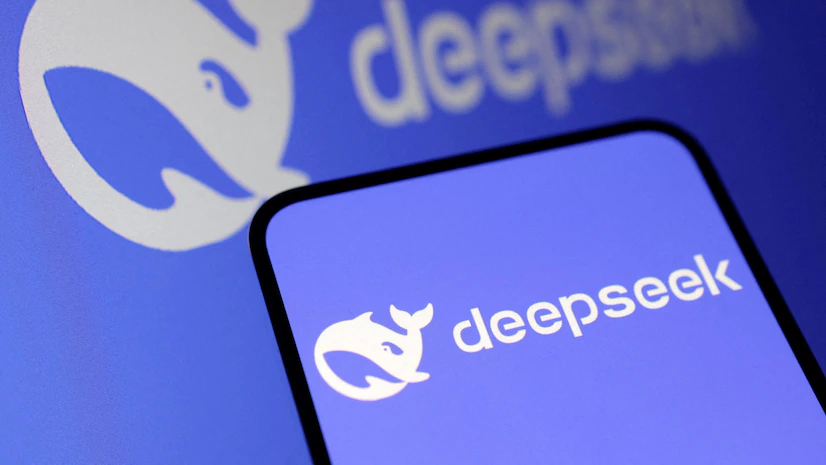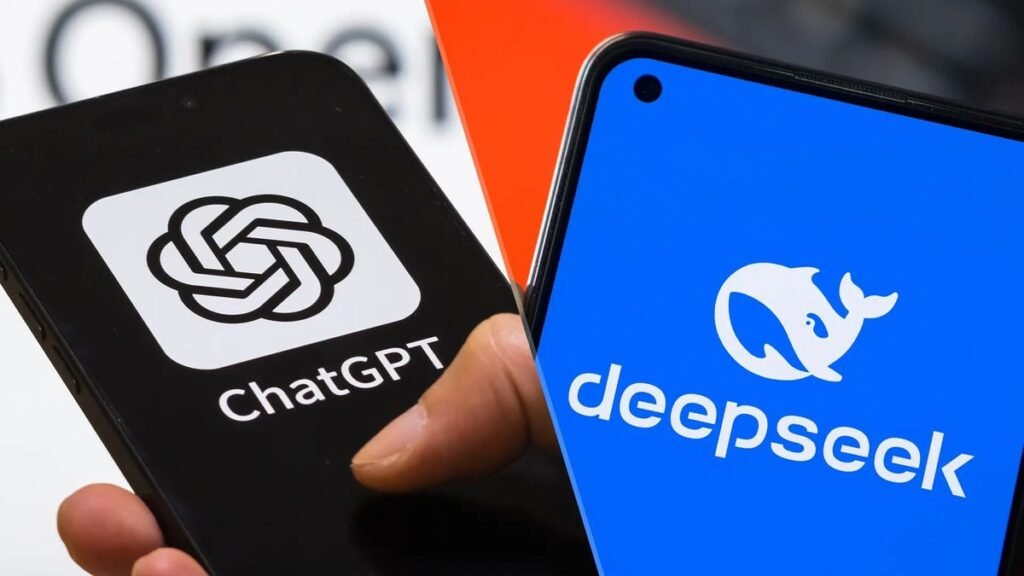
A startup has once again created a buzz in the entire tech industry, and no, it is not OpenAI Chatgpt. It is a Chinese-made artificial intelligence (AI) model called DeepSeek which was released on 20th January, quickly impressing AI experts before it got the attention of the entire tech industry and the world. Jensen Huang, Sam Altman, and US President Donald Trump calling its model ‘excellent’, ‘impressive’, and a ‘positive development’, respectively.
What makes DeepSeek so special is that the company claims that it was built at a fraction of the cost of industry-leading models like OpenAI – because it uses fewer advanced chips. This caused chip-making giant Nvidia to shed almost $600bn of its market value on Monday, which is the biggest one-day loss in US history. Currently, DeepSeek has crossed ChatGPT as the App Store’s top app. Its recent release of the open-source artificial intelligence (AI) model R1 has sent the whole tech industry into complete shock.
What Is DeepSeek?
DeepSeek, a startup from Hangzhou, China was founded in 2023 and it launched its first AI language model that same year. It has made its generative AI algorithms, models, and training details open-source, which allows anyone to use freely, modify, view, and design documents for building purposes. DeepSeek is a free AI-powered chatbot, which works very much like ChatGPT.
It is reportedly as powerful as OpenAI’s o1 model which was released at the end of last year- in tasks including mathematics and coding.
Like 01, R1 is a reasoning model, which produces responses incrementally, stimulating a process similar to how humans reason through problems or ideas. It uses less memory as compared to its rivals, which makes it less costly to perform tasks.
Like many other Chinese AI models- Baidu’s Ernie or Doubao by ByteDance DeepSeek is trained to avoid politically sensitive questions.
Deepseek says it has been able to do this cheaply – researchers behind it claim it cost $6m to train, a fraction of the “over $100m” alluded to by OpenAI boss Sam Altman when discussing GPT-4.
DeepSeek’s founder reportedly built up a store of Nvidia A100 chips, which have been banned from export to China since September 2022.
Some experts believe this collection – which some estimates put at 50,000 – led him to build such a powerful AI model, by pairing these chips with cheaper, less sophisticated ones.
Who Is Behind DeepSeek?
DeepSeek was founded in December 2023 by Liang Wenfeng, who graduated from Zhejiang University with degrees in electronic information engineering and computer science.
Liang Wenfeng now finds himself in the international spotlight, he was recently seen at a meeting hosted by China’s Premier Li Qiang, reflecting DeepSeek’s growing prominence in the Chinese AI industry.
Unlike many American AI entrepreneurs who are from Silicon Valley, Mr Liang also has a background in finance. He is the CEO of a hedge fund called High-Flyer, which uses AI to analyse financial data to make investment decisions-what is called quantitative trading. In 2019 High-Flyer became the first quant hedge fund in China to raise over 100 billion yuan.
In a speech he gave that year, Liang said, “If the US can develop its quantitative trading sector, why not China?”
In a rare interview last year, he said China’s AI sector “cannot remain a follower forever”.
He went on: “Often, we say there’s a one or two-year gap between Chinese and American AI, but the real gap is between originality and imitation. If this doesn’t change, China will always be a follower.”
Asked why DeepSeek’s model surprised so many in Silicon Valley, he said: “Their surprise stems from seeing a Chinese company join their game as an innovator, not just a follower – which is what most Chinese firms are accustomed to.”
Impact On The Global Market

Apart from Nvidia’s market loss, Oracle and Google plunged by 13.8 percent and 4 percent, respectively.
“The emergence of Chinese AI giants like DeepSeek is a wake-up call for U.S. markets and businesses. This arrival goes beyond a simple matter of technological competition; it is a direct challenge to the dominance of American innovation and the stability of our financial markets,” said George Kailas, CEO, Prospero.Ai. “When companies like Nvidia lose billions overnight, it highlights how vulnerable even the most established players are in a rapidly shifting landscape.”
DeepSeek stated that its latest models were developed using Nvidia’s H800 chips, which is allowed in China. This demonstrated that cutting-edge AI research doesn’t necessarily require the most advanced hardware. Currently, China has around 2,000 AI startups, while the United States has approximately 9,500 AI Startups.
“This genuinely democratises AI and gives countries who don’t have the existing infrastructure a huge leap forward to experiment and be part of the frontier. However, from a supply/demand perspective the GPU market which Nvidia dominates is still far away from hitting peak demand,” said Bruce Keith, CO-Founder & CEO, InvestorAi.
China Is Celebrating DeepSeek’s Impact
DeepSeek’s rise is a huge boost for the Chinese government, while the Communist Party is yet to comment, Chinese state media was eager to note that Silicon Valley and Wall Street giants were “losing sleep” over DeepSeek, which was “overturning” the US stock market.
“In China, DeepSeek’s advances are being celebrated as a testament to the country’s growing technological prowess and self-reliance,” says Marina Zhang, an associate professor at the University of Technology Sydney.
“The company’s success is seen as a validation of China’s Innovation 2.0, a new era of homegrown technological leadership driven by a younger generation of entrepreneurs.”
But she also warned that this sentiment may also lead to “tech isolationism”.
What Does It Mean For India
Despite several AI initiatives undertaken by the Indian government, the AI race still has a long way to go. Some of the key AI initiatives by the Indian government include the National Program on Artificial Intelligence, the Applied AI Research Centre in Telangana, the US-India AI Initiative, and the IndiaAI Mission.
As of April 2024, India has around 6,200 AI startups. In 2024, India’s AI startups secured USD 560 million in funding, predominantly from early-stage investments. This marks a 1.25x increase compared to 2023.
Narendra Bhandari, General Partner, Seafund notes that Indian startups should aspire to build relevant models at much lower costs. “The government should focus on a few areas such as funding the capital build out as laid out in the budgets to much higher returns in the new environment, attracting talent (Indian Diaspora) from across the globe to help build out these newer models, and balancing the research funding to include universities and research labs,” he said.
Bhaskar Majumdar, Managing Partner, Unicorn India Ventures feels that India should see AI as a “solution” rather than software. “The Deepseek moment is a reminder that accepting the status quo is a wrong strategy. All of us will witness significantly power-efficient, high-performance, solution-centric chips in the next few years that will shake the likes of NVIDIA. Anticipation of this disruption will benefit India and its solutions community,” he said.
The global AI market is projected to grow from USD 214.6 billion in 2024 to USD 1,339.1 billion in 2030. Meanwhile, the domestic AI market is expected to reach USD 17 billion by 2027.
Follow Techsgyaan to get more news and updates regarding AI.
AUTHOR
With over 4 years of experience in content writing, I specialize in crafting high-quality, engaging content for the tech, sports, gaming, and technical niches. My expertise lies in simplifying complex concepts and creating content that resonates with both technical and general audiences. Whether it’s a detailed guide, an in-depth review, or an informative article, I deliver content that drives engagement and enhances brand visibility. Let’s connect and bring your content to life!
Swastik



